Inadequate information released after Southport attack by authorities, says terror law reviewer
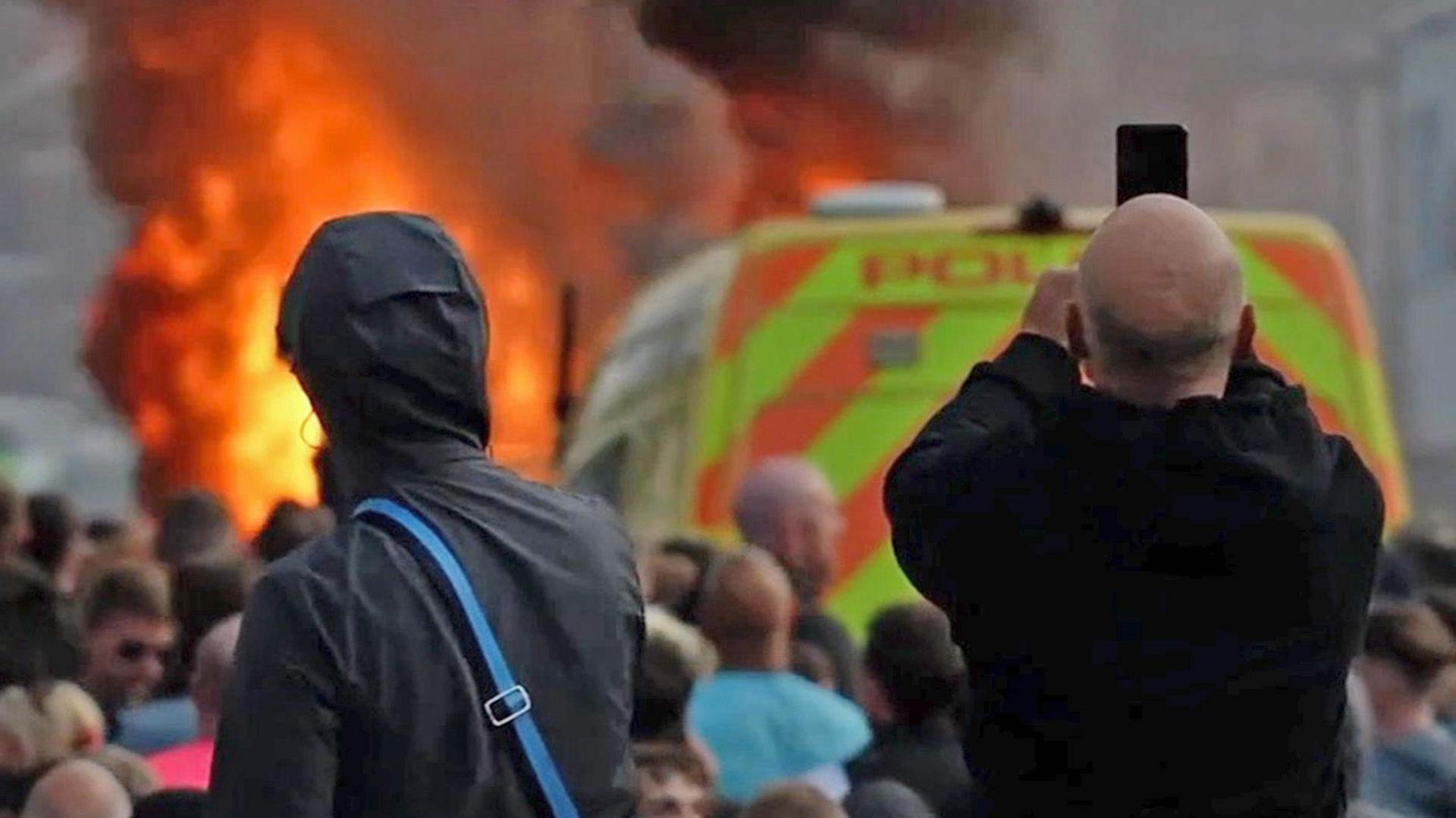
The worst disorder in the UK for more than a decade followed the attacks
- Published
In the aftermath of the Southport knife attack there was a sense of national trauma over the killings of three girls at a summer holiday dance and yoga class. Seven-year-old Elsie Dot Stancombe, Bebe King who was six, and nine-year-old Alice Aguiar were murdered. Eight other children were badly injured.
Anger and disbelief soon followed, prompting burning questions over the identity, background and possible motive of the attacker, and suspicions about why the authorities appeared to be saying a lot less than they knew.
Despite public demands for information, the police provided few details about the attacker. There was very little information in their statements about his background. He was not even named because he was 17 at the time of the attack. One thing was made public early on - it was not being treated as terror-related by the authorities.
The UK's independent reviewer of terrorism legislation has told BBC Panorama that he believes the quality and quantity of information released by the authorities in the hours after the attack on 29 July 2024 was "inadequate".
"People got the sense that something was being withheld or fudged in some way, and that led the social media types who wanted to spread disinformation to spread disinformation," Jonathan Hall KC said.
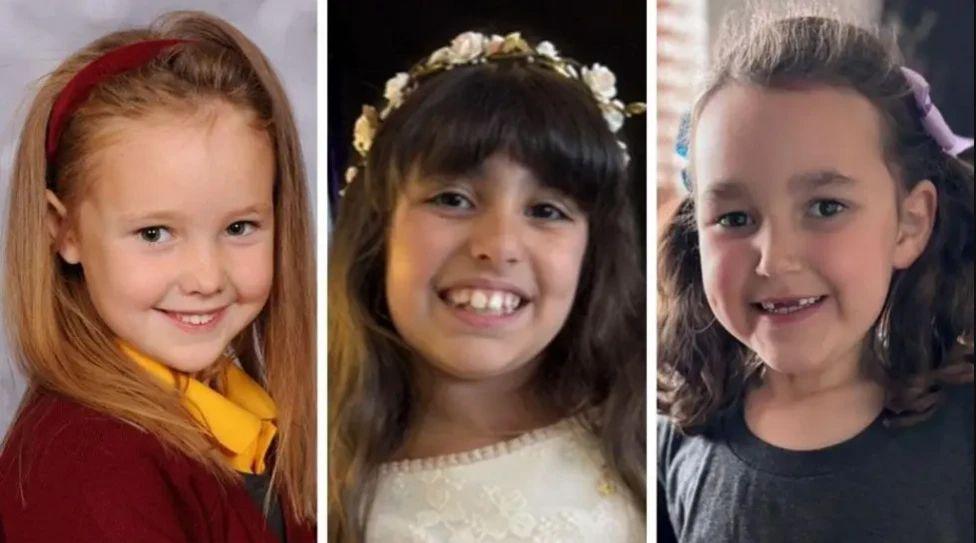
Elsie Dot Stancombe, Alice Aguiar and Bebe King died
The day after the attack, rioters targeted a mosque in Southport. The online rumour mill had identified the attacker as a Muslim asylum seeker who had been on an MI6 watch list. It was all untrue but it served as fuel for four days of rioting and violence - the worst the UK had seen in more than a decade.
There was swift and widespread condemnation, but this was not confined to the violence and disorder. The very act of questioning whether the authorities were withholding information from the public was also criticised on the grounds that it had stoked the flames of disorder.
But the questions have not gone away.
BBC Panorama has spent weeks in Southport, where everyone seems to know someone who has been affected by the attack. What also quickly became apparent is the sense among many residents that the authorities have been concealing information.
"Cover-up" is one term we heard repeatedly. So, is it justified?
What the police said, and when they said it, is important. On the evening of the attack, the Chief Constable of Merseyside Police, Serena Kennedy, held a press conference. She said "a 17-year-old male from Banks in Lancashire, who is originally from Cardiff" had been arrested in connection with the stabbings. Two hours later, Merseyside Police amended this to "born in Cardiff" after receiving confirmation of the attacker's birth place.
But police did not divulge family background details, including that the attacker's parents were Christians who had come to the UK from Rwanda.
The attacker was not named because he was one week shy of his 18th birthday. In that initial statement, the police said the motive was "unclear" but at that moment in time the incident was "not being treated as terror-related".
But Jonathan Hall KC told BBC Panorama that the authorities could, and should, have released more information after the attack.
"The public could have been told immediately that there had been an attack by a 17-year-old male who was black, British, born in Wales and has lived in the UK all his life," he told us.
"That he comes from a Rwandan background, and as far as the police were aware, from a Christian background. That it was not possible to say whether he had an ideology or that he was a terrorist. But the police are looking at, at pace, all the material that they found."
Merseyside Police told the BBC it never reveals ethnicity details in press releases about arrests, except in cases of missing people or people on the run. The force also said that it corrected misinformation about the attacker's name.
Panorama - The Southport Attack
It was a crime that horrified the nation. Three young girls murdered and another eight seriously injured at a Taylor Swift yoga and dance workshop. Reporter Judith Moritz meets survivors of the attack.
Ultimately, the Southport attack was never classed as terrorism by the authorities as that would have required evidence of an ideological motive, and the police have said they found no such evidence.
"We were clear that there was no evidence, information or intelligence to suggest that this was terrorist related," Chief Constable Serena Kennedy told Panorama.
"We were really clear that we would keep that under continual review, which we've done from day one. But our colleagues in counter-terrorism policing, working with ourselves, were satisfied that this was not a terrorist related incident, and that's remained the case throughout."
Jonathan Hall agrees with this assessment, but says that in the immediate aftermath of the attack, the police should have said it was not possible at that stage to say whether the attacker was a terrorist or not.
Counter-extremism expert Ian Acheson agrees. "I don't think they could conceivably have arrived at that conclusion on the basis of the evidence," he said.
"I think the comms decision was 'let's say as little as possible and let's try to dampen down community feeling by saying, 'no, there's nothing to see here',' which of course then created a narrative that was exploited by misinformation and disinformation."
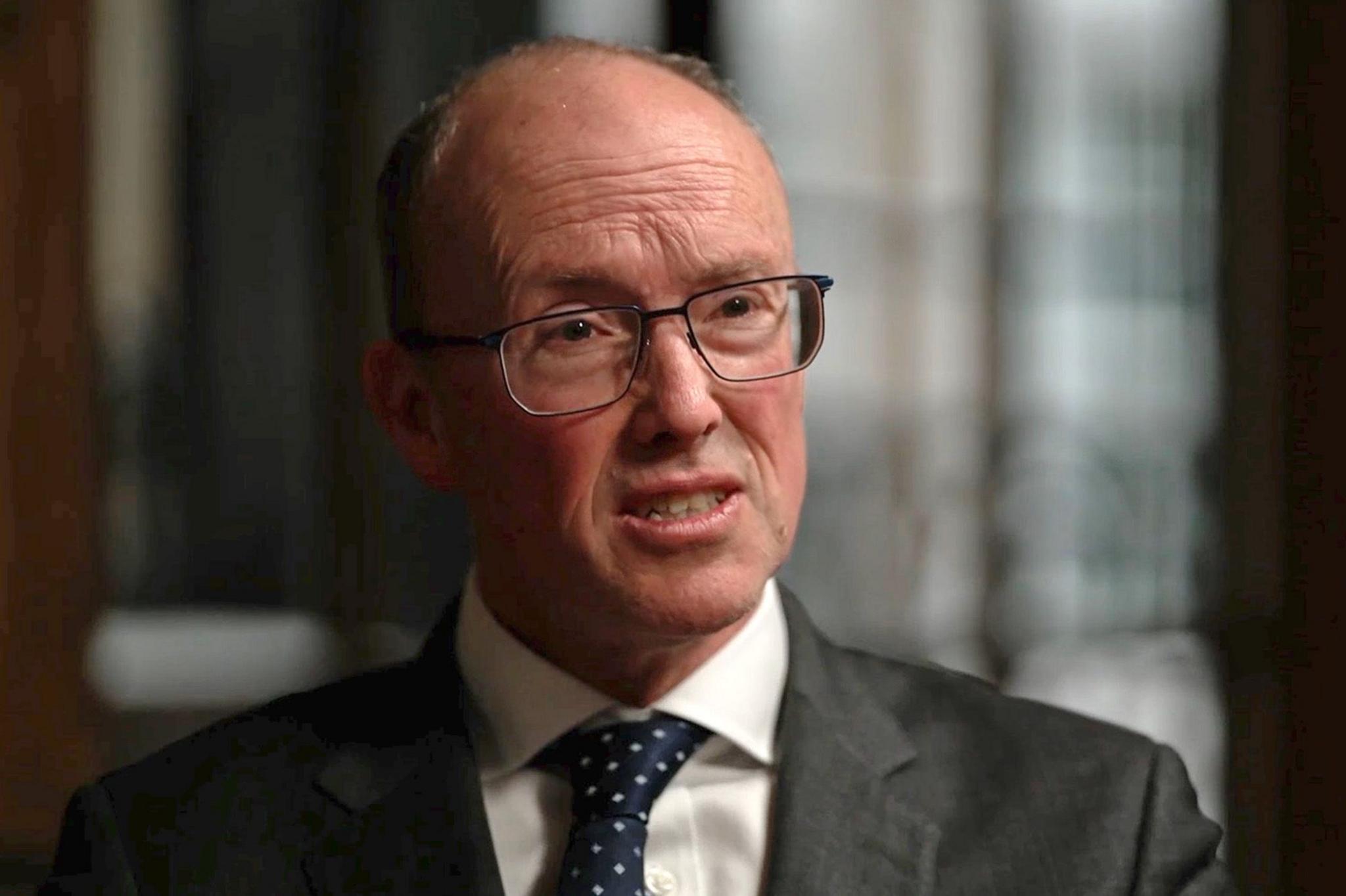
Jonathan Hall KC was appointed to his role in 2019
The day after the attack, Merseyside Police issued a press release reiterating that the incident was "not currently being treated as terror-related". That same day, however, police halted their search of the attacker's house after finding a substance under his bed that they suspected may be poison.
The substance was sent to the Defence Science and Technology Laboratory at Porton Down to be examined by an expert in chemical and biological warfare agents. Three days later, the lab confirmed that the suspicious substance was the poison ricin, but the public was not told. The next day, police found excerpts of an al-Qaeda training manual on one of the attacker's computers. But the public was not told about that either.
Ministers had been kept informed of these developments, but another three months would pass before the police publicly announced the discovery of the ricin and the al-Qaeda manual.
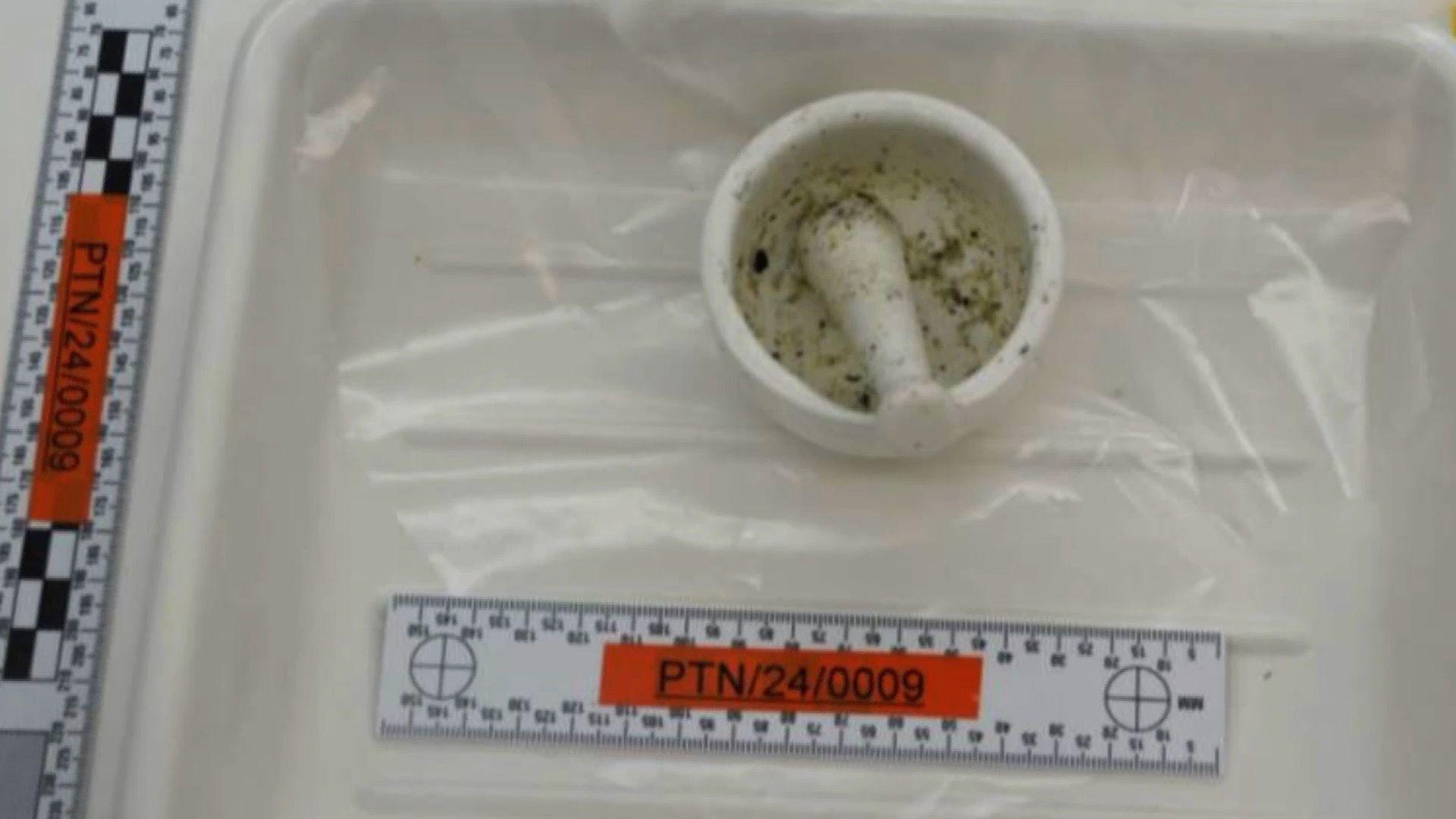
Police found a substance later established as ricin under Rudakubana's bed
On 1 August, three days after the attack, the suspect was officially identified as Axel Rudakubana after a judge lifted restrictions on reporting his name.
But still, to some people, the withholding of other information by the authorities has led to suggestions of "cover-up". There is, however, an alternative explanation.
Chief Constable Serena Kennedy told Panorama: "My priority was to make sure that we got justice for the families of the victims. And whilst I would have liked to have said more, I was not going to risk bringing Rudakubana to justice."
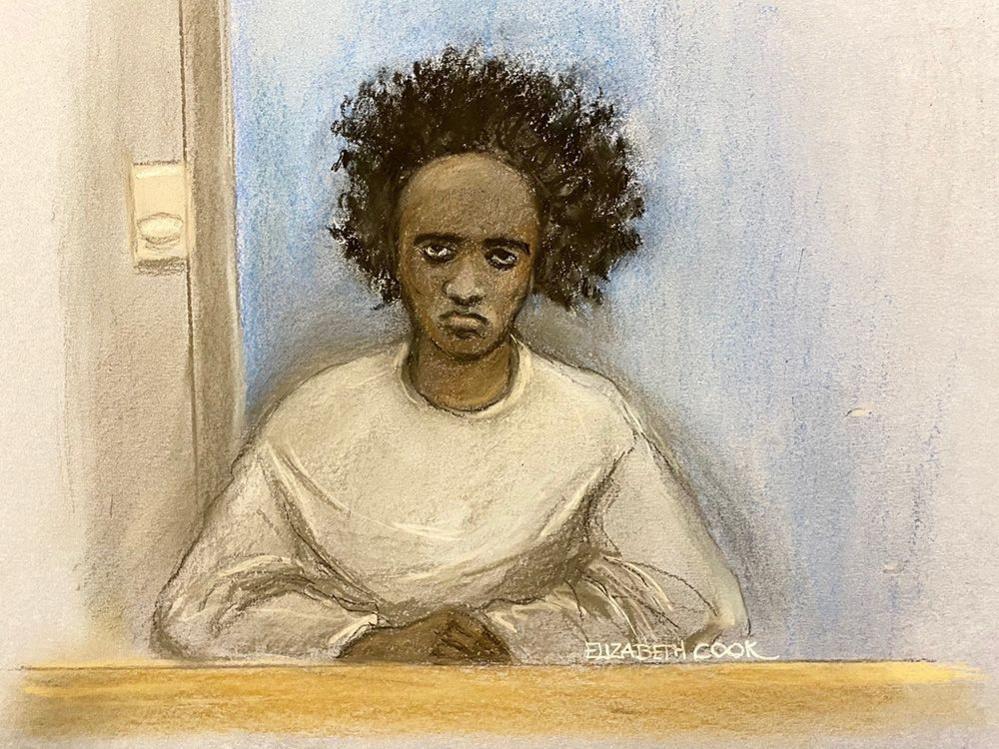
Rudakubana pleaded guilty to three charges of murder and 10 charges of attempted murder and was sentenced to a minimum of 52 years
Legally, there are restrictions about what can be said before a trial to prevent a jury from being influenced. Saying too much or the wrong thing could potentially have allowed Rudakubana's defence to argue that a fair trial was impossible.
Speaking after Rudakubana's guilty plea, Prime Minister Keir Starmer reiterated this reason for caution: "Yes, I knew the details as they were emerging. That is the usual practice in a case such as this. But you know and I know that it would not have been right to disclose those details.
"The only losers if the details had been disclosed would be the victims and the families because it ran the risk the trial would collapse."
But following Southport, there is now growing acknowledgement that more openness may be needed in the way the authorities communicate with the public.
"We're operating a criminal justice system which, in order to protect the courtroom, really locks down information about investigations when they're under way," Assistant Commissioner Matt Jukes, the UK's head of counter-terrorism policing, told Panorama.
"But I should also be clear it's a system which, in my view, was built for a different age and I'm absolutely certain that we need to find ways of saying more about those investigations."
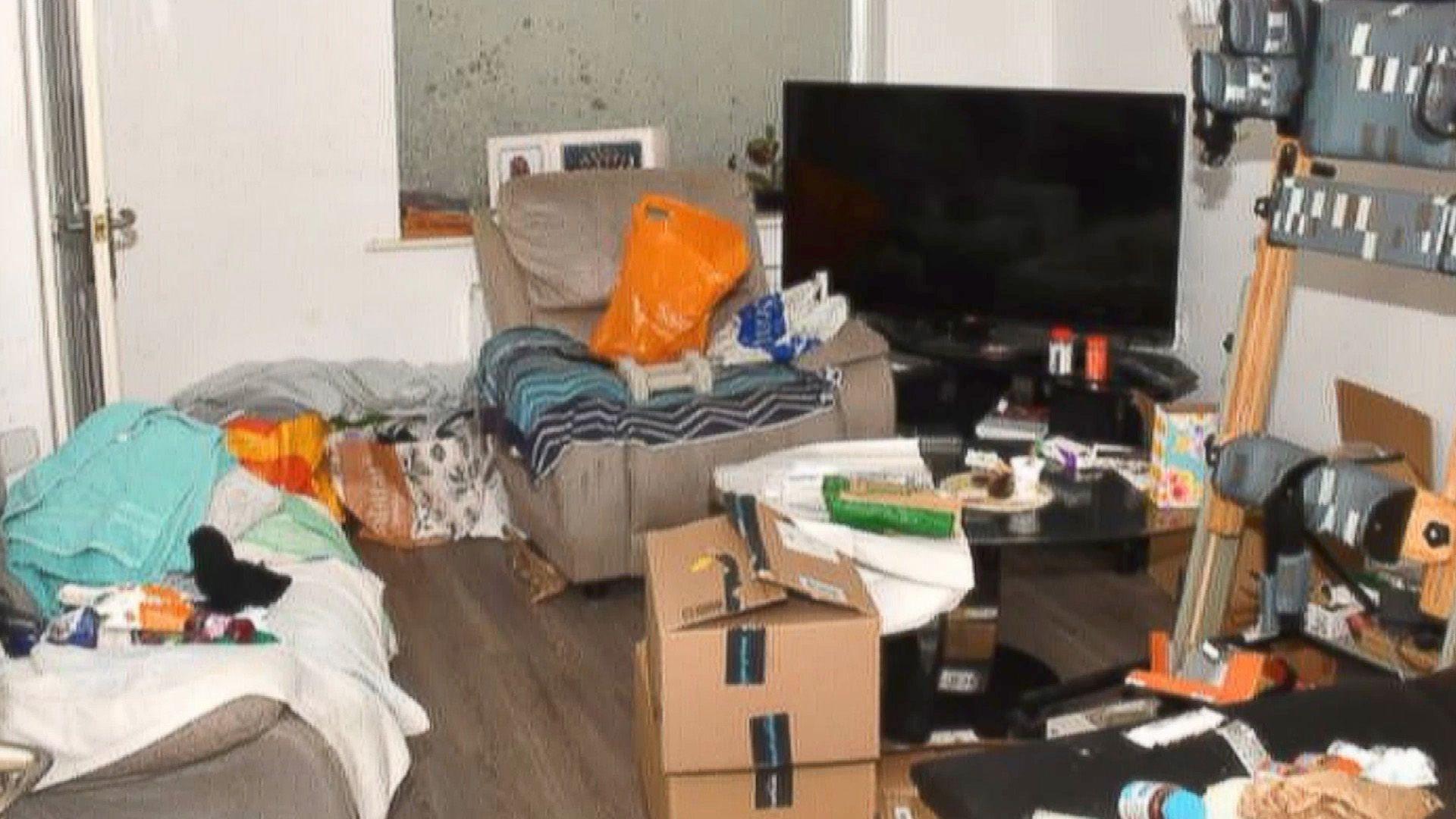
A police search of the family home revealed weapons in his bedroom and a knife in the living room (pictured)
One question that remains unanswered is how much Rudakubana's parents knew about their son. A police search of the family home revealed weapons in his bedroom and a knife in the living room, as well as materials for producing ricin. On four occasions between 2021 and 2022, Rudakubana's parents called the police following concerns about their son.
A week before the Southport attack, Rudakubana's father stopped him taking a taxi to his old school. His son was dressed in the same green hoodie he wore on the day of the Southport attack. Police now believe that Rudakubana had intended to carry out an attack, but on that occasion, his parents didn't call the police.
Merseyside Police told us they couldn't discuss questions about what Rudakubana's parents knew, citing an "ongoing live investigation". The Home Office also declined to comment on the circumstances in which his parents came to the UK.
Last month, Rudakubana pleaded guilty to three charges of murder and 10 charges of attempted murder and was sentenced to a minimum of 52 years. The judge said he would have been given a whole life term had he been an adult at the time of the attacks.
Following Rudakubana's conviction, Merseyside Police have released more footage of the moment when he was arrested.
Watch police bodycam footage of the arrest of Southport attacker Axel Rudakubana
The government has announced a public inquiry into the many missed opportunities by multiple agencies to stop Rudakubana. A significant amount of detail on these failings has already been released, raising tough questions for several agencies including Lancashire Police and the counter-extremism programme Prevent.
In March 2022, Lancashire Police found Rudakubana on a bus with a knife. It was one of several interactions the force had with the teenager, but he was not charged. He was also referred to Prevent three times but on each occasion the case was closed.
Assistant Commissioner Matt Jukes told Panorama: "I'm responsible for the police part of the Prevent strategy. And so, the sense that there were moments when that system might have made a more decisive difference absolutely sits with me."
Lancashire Police told us that they "stand ready to engage fully" and that the public inquiry is the "right place for the interactions of the various agencies… to be scrutinised and considered". They say they are "fully committed to ensuring any learning is identified."
Update 25 February 2025: This article has been updated to clarify the timing of Merseyside Police's actions on 29 July 2024 and the force's policy on naming suspects